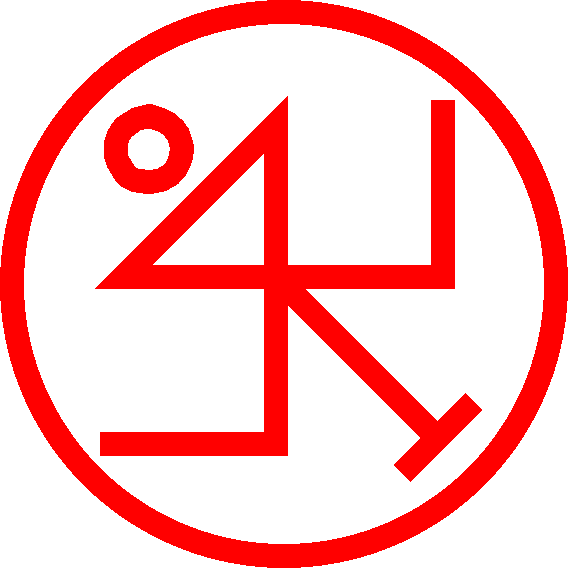An exercise in Kabbalistic exegesis suitable for Beginners
(This work was first published on the Internet in Email Without Tears vol. 2 issue 6, 1 June 1993 and has been edited since then. It was a lot more affected in style when I first wrote it; I was less confident in my own writing at the time. –Shawn)
Consider the Greek word Εὕρηκα (“Eureka”), which means “I have found (it)”. It is famously attributed to Archimedes in his bath, when he figured out the principle of displacement. Can we find Kabbalistic meaning in it? Indeed we can; in fact, we can show that this word contains an expression of the principles of Thelema.
First, we note that the word has six letters. Six is the number of Tiphereth, the center of the Tree, and the Holy Guardian Angel, the attainment of whose Knowledge and Conversation is the central task of every Thelemite.
Now we consider the meanings of the individual letters. The initial Epsilon, having the value 5, is symbolic of Geburah, the Sephira of Strength and of Mars. Thus it suggests conflict and power.
The second letter, Upsilon, has the value 400. Thus is equals the Hebrew כשף, “to pray”, “to use incantations”, etc. (using the non-final value of the letter Pé). This is a clarification of the first letter, and emphasizes the magical nature of the aforesaid conflict.
The third letter is Rho, standing for 100. 100 stands for “vessels or vases”, signifying that we should make ourselves fit vessels for magical strength.
So the first three letters have set forth the idea that there is a magical conflict, and we should prepare ourselves for it.
The last three letters give indication of how this may be done. The fourth letter, Eta, has the value 8. 8 is equivalent to both “to will, to intend” and “desired, beloved” — a concise statement of the Law of Thelema. The fifth letter, Kappa, has the value 20, being the numberof “fraternity.” And the final letter, Alpha, is the letter of Unity, bearing the value 1. So it is seen that the word “Eureka” gives a clear formula for use in cases of Magical Conflict: that the Strength needed to endure is to be obtained through Fraternity, and through Unity, and through Love, which is “the law, love under will.”
Now let us consider the meanings of 534, which is the total value of the word Eureka. Crowley says 534 itself is equivalent to “a certain name of GOD” (קלדשק), although finding any other source for this name has proven challenging. But we may find that there are numerous hidden meanings within.
First, let us look at factorizations of 534. There are but three prime factors of the number: 2, 3, and 89; hence the three factorizations to consider are 2 x 267, 3 x 178, and 6 x 89.
2 x 267 is a comment on duality, signified by 2. A look at Sepher Sephiroth shows that 267 signifies “illicit, forbidden,” which is the nature of duality — illicit, to be avoided. But conversely, 2 is the number of Chokmah, and thus the number 534 reveals how Chokmah, the sphere of wisdom, is “forbidden” to the uninitiated.
3 x 178 also yields valuable information. For 3 is the number of Binah, “Understanding” — the reconciliation of the duality implied by 2. And 178 represents “the loins”, or “the lower part” — the foundation upon which growth and development is based. It also represents “good pleasure, choice, decision, will” — again, a possible allusion to the Law of Thelema. Decision and free will is seen as the basis for reconciliation (3), which in turn may be seen as the basis of good pleasure.
Finally, 6 x 89 recalls once again Tiphareth, Beauty, the sixth sphere of the Tree of Life. 89 stands for many, many things. In Hebrew it stands for “Silence”, or “Shut up.” It represents the Beauty inherent in Silence, in calmness, in the ability to remain quiet. Notably, in English Qabalah 31, it also equals “Gnosis” and “Beautiful”, just to name two of its correspondences.
The dedicated student of Hermetic Kabbalah will proceed to discover other words, as rich in meaning as “Eureka”, by following lines of thought akin to those demonstrated in this essay.
A Kabbalistic lexicon such as “Sepher Sephiroth” (published in 777 And Other Qabalistic Writings of Aleister Crowley) is invaluable for this process, although Crowley’s work contains numerous errors. My own Gematria Calculator and Database incorporates the entries from “Sepher Sephiroth” — many with critical commentary and corrections by myself, the result of research on the Hebrew words — and many more, from Greek and English (using the values of English words obtained using my English Qabalah 31 system).
